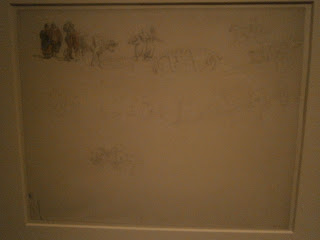I really enjoyed looking at turners work and his experiments
with colour. I specifically was interested in the way he used mixed media to
create various marks and tones for example the way he used water colour and
pencil in his study of a tree.
 |
| JMW TURNER 1775 - 1851 SMOW STORM |
|  |
| JMW TURNER 1775 - 1851 FISHERMAN AT SEA | | |
 |
| JMW TURNER 1775 - 1851 MEN WITH HORSES CROSSING RIVER |
 |
| JMW TURNER 1775 - 1851 FORUM ROMANUM |
COLOUR INTO LINE
Turner’s engraver’s had to produce
complex patterns of black lines which, when printed onto white paper, could
convey the impression of colour. They used many skilful techniques and tricks
to ‘translate’ colours into a language based on tone. Deep colours such as blue
appeared dark, whilst lighter colours such as yellow would be created using
white. Mid-tones such as red might be black or white, according to the emphasis
placed within turner’s picture
Quote: # he that impresses the
observation or simulates the associate idea of a colour individually is the
great artist’
Turner and the Development of Colour
in Turners time, discourses on colour theory were rapidly expanding, giving rise to the publication of sever influential texts in Britain and Europe in the eighteenth and nineteen=nth centuries, theorists set out to define colour comprehensively, each propounding a holistic ‘colour theory ‘since the publication of Isaac Newton’s Optiks, others followed in examining the nature of primary colours. in his (natural system of colours) moses Harris sought to demonstrate the multitude of colours, and colour relationships, that could be created from the three primaries, red yellow and blue.
Based on Harris’s prismatic colour wheel Turners’ Colour Diagram was used in his Royal Academy lectures on atmospheric perspective, in which he defined the relationships between ‘aerial’ colours as in light and material colours as in pigments.
 |
JMW TURNER - STUDY OF TREES 1820-1830
|
 |
| JMW TURNER |
| SAILORS GETTING PIGS ON BOARD ON A CHOPPY SEA 1792-3 |
 |
| JMW TURNER - BASLE - 1807 |
 |
| JMW TURNER - CHICHESTER CANAL - 1828 |
 |
| JMW TURNER - POWIS CASTLE,MONTGOMERY |
| 1836 |
 |
| ATKINSON GRIMSHAW |
| LIVERPOOL QUAY BY MOONLIGHT |
 |
| JOHN MARTIN - THE LAST DAY OF JUDGMENT |
 |
| JOHN MARTIN - THE GREAT DAY OF HIS WRATH |
 |
| JOHN MARTIN - THE PLAINS OF HEAVEN |
John Martins apocalyptic paintings also attracted my eye by
the use of the composition and colours,
 |
| CHRISTOPHER RICHARD WYNNE |
| BURSTING SHELL |
 |
| PATRICK CAULFIELD - AFTER LUNCH - 1975 |
In the art gallery I really liked Patrick Caulfield’s work
due to the combination of two different art styles, as you can see he has integrated
a very traditional painting within a very graphic environment which immediately
creates a juxtaposition and draws the audience in.
 |
| WILLIAM ROBERTS |
| SKETCH OF A RIVER PAINTING 1919 |
 |
| PAUL NOBIE - LIDONOB - 2000 |
 |
| J.D FERGUSSON - OAK RYTHYM - 1925 |
 |
| GEORGE FREDERIC WATTS - THE MINOTAUR 1885 |





































No comments:
Post a Comment